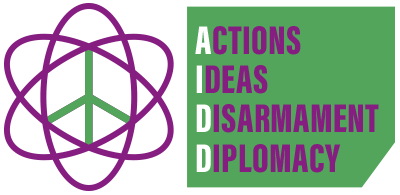Welcome TO AIDD website
Acronym Institute for Disarmament Diplomacy
Research, analysis and strategies for nuclear disarmament, global security, women, peace, and climate justice since 1994.
As a UK-based civil society organisation with United Nations (ECOSOC) consultative status, AIDD engages with governments, parliamentarians and civil society around the world. Through education, talks, presentations and publications we continue to highlight dangers to human survival and positive actions we can all take to tackle the threats and risks we face from nuclear war, climate destruction, and all forms of patriarchal violence that drive wars, insecurity and poverty.
Through this website you can access contemporaneous articles on nuclear weapons developments as well as books, reports and book-chapters on the diplomatic and civil society work that has led to adoption of various treaties and agreements. You can also access Disarmament Diplomacy reports and analyses from 1994-2009, including the Comprehensive Test Ban Treaty (CTBT), Non-Proliferation Treaty (NPT), and UN and treaty-based developments to control all kinds of weapons (from chemical and biological armaments to landmines and ‘small arms and light weapons’ (SALW), as well as efforts to promote disarmament and security in Outer Space. The website also links to over 50 analyses that Rebecca Johnson wrote for OpenDemocracy from 2010 onwards, which tell an important – and contemporaneous – story about the humanitarian disarmament strategies, obstacles, and processes that led to the ground-breaking 2017 Treaty on the Prohibition of Nuclear Weapons (TPNW).
From 2009 onwards, Rebecca and AIDD worked with the International Campaign to Abolish Nuclear Weapons (ICAN, a project of the International Physicians to Prevent Nuclear War – IPPNW – in Australia from 2007). As a co-chair of ICAN’s Core Group, Rebecca was responsible for establishing ICAN as a legal organisation in Geneva, Switzerland, in 2010, becoming its first president, and developing many elements of the humanitarian disarmament strategy that led to the TPNW (which you can read about in various book chapters and articles from 2010, now accessible via this website).
Today, AIDD is represented in ICAN’s Steering Group by Rebecca (Rebecca Eleanor Johnson nowadays), Gari Donn (UN House Scotland director, and AIDD Board Member), and Janet Fenton, AIDD consultant (with Scottish CND, WILPF and Secure Scotland). In addition to supporting ICAN’s Executive Director Melissa Parke and staff team, we work closely with UNA-UK and UN House Scotland to coordinate information and TPNW-related campaigning and meetings involving ICAN partners and TPNW supporters in the UK.
Actions, Ideas, Disarmament and Diplomacy
AIDD’s objectives, in keeping with our feminist, humanitarian principles, include antiviolent approaches as well as nonviolent practices. We also work with analysts and activists around the world to connect climate and nuclear developments and concerns, and persuade our governments to prevent the use of nuclear weapons and reduce fossil fuel production, emissions and consumption.
Our current priorities include:
- Ending reliance on nuclear weapons and promoting the full implementation of the nonproliferation and disarmament obligations in the TPNW, CTBT and NPT and relevant bilateral, multilateral agreements and UN resolutions. We call for an end to all nuclear-weapons production, deployments, stockpiling, proliferation and related activities – including policies and financing – that would enable anyone to acquire or use nuclear weapons or create ‘dirty bombs’ through attacks on nuclear facilities.
- Connecting with NGOs and UN diplomatic initiatives to oppose armed and gender-related violence and ‘small arms and light weapons’, with the aims and objectives of instituting and implementing more effective legal and diplomatic measures, and furthering the objectives of relevant UN Sustainable Development Goals.
- Implementing UN Security Council Resolution 1325 (2000, on Women, Peace and Security) and related UN Sustainable Development Goals and resolutions that support women as agents of peace, disarmament, development and environmental protection, as well as recognising that women and children are disproportionately targeted by male violence in armed conflicts, war, and the patriarchal systems that continue to produce, sell, use and traffic in weapons of all kinds. AIDD has been working for the past three years with Common Cause UK in a collaborative project involving education and training women and girls to carry forward Women Peace and Security (WPS) initiatives in the Great Lakes region of Africa.
- Promoting alternatives for real, human and environmental security by challenging nuclear-military-industrial drivers of armed violence, tackling all uses of explosive weapons, and engaging with affected communities and especially women to bring about just and sustainable peace-building and security outcomes. This work includes supporting people and communities harmed by nuclear use, production and testing around the world, with AIDD’s emphasis on harmful activities by successive UK governments from the 1950s that have contaminated indigenous communities in the Pacific and Nevada (Test Site) areas. We also highlight ongoing dangers and impacts related to nuclear practices and facilities in Scotland (Faslane and Coulport), England (Aldermaston and Burghfield), and the transporting of nuclear weapons and materials between such sites.
With financial support from the Joseph Rowntree Charitable Trust (JRCT), and help from GreenNet and Ampersand, AIDD is in the process of updating and restoring links to our publications and resources, including two now-archived websites giving access to Acronym Institute and Disarmament Diplomacy issues from 1994. This is a work in progress, and we apologise for the time this is taking.
